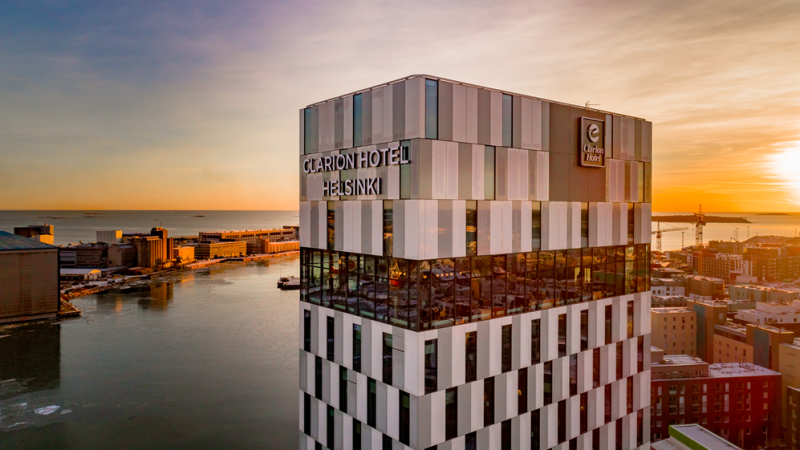Hospitality experts BaxterStorey pride themselves on producing fresh, locally sourced, good food made by well-trained, talented teams. We last looked at the company in 2018. Of course, we have seen eventful few years since then.
 “Covid notwithstanding, we’ve been doing very well, largely due to the fact that we are an independent business, and part of WSH, a larger family of businesses that gives us strength,” points out Mike Hanson, Director of Sustainable Business for WSH. “We are flexible, nimble and can easily adapt to the needs of our clients.”
“Covid notwithstanding, we’ve been doing very well, largely due to the fact that we are an independent business, and part of WSH, a larger family of businesses that gives us strength,” points out Mike Hanson, Director of Sustainable Business for WSH. “We are flexible, nimble and can easily adapt to the needs of our clients.”
“Our sustainability goals have been progressing really well,” Hanson tells us. “The lockdowns caused a lot of reflection, people focused on their families and reconnected with nature”.
The lockdown met the consequences of Brexit, and that combined with the COP26 conference in Glasgow, created a perfect storm of introspection and concern for the environment, putting a much-needed spotlight on sustainability and the climate crisis.
“Sustainability has shot up the agenda, we are seeing more engagement across the supply chain, which will allow greater action going forward,” Hanson says. “We have targets in place across WSH to monitor and mitigate carbon emissions. We are committed to following GHG Protocol, and we are actually looking at achieving Scope 1 (greenhouse emissions created directly) and 2 (emissions made indirectly) Net Zero by 2030, reaching Scope 3 (indirect value chain emissions) by 2040, with interim targets of 65% reduction by 2025, based on the 2019 baseline.”
Socially Engaging
ESG is a huge topic of discussion, not just across the hospitality industry but in every business sector.
“We are working hard on implementing ESG across our business, looking at the social aspects as well as the environmental ones,” explains Hanson. “It’s important we give autonomy to our teams to drive this agenda, particularly around diversity and inclusion. This year we launched our DIVEIn committee, to ensure we are doing more to recognise and celebrate diversity. We have our Women in Hospitality committee, represented by women across our business from chef managers to operations, they are working on more support for women with parental leave, career development and mental well-being.
We want to create a work environment that celebrates individuality and recognises the power it brings in terms of food innovation and creativity, but also the importance of an inclusive culture where all our people feel happy and supported at work.
Over the past two years, they have trained 95 mental health first aiders- colleagues who volunteer their time to those who need a friendly chat over a coffee or the phone, signposting further resources if needed.
In its effort to promote the social aspect of its ESG agenda, BaxterStorey has collaborated with the anti-homelessness social enterprise, Social Bite.
“We have opened two coffee shops, one in Edinburgh, and our first high street Social Bite café in London, which employs people from the homeless community to work there full-time. The charity aims for 1 in 4 of their staff to come from a background of homelessness.
It’s a very exciting partnership,” Hanson explains.
“We can develop opportunities in the communities where we work and bring positive change through the power of food and collaboration”.
Getting Back in the Green
The progress BaxterStorey has made is all the more impressive for the environment it has had to work in.
“Over the last year it has been a challenge getting business engagement at a grassroots level while recovering from Covid,” Hanson admits. “Like the wider industry, tackling recruitment challenges has become our number one focus.
“The job market has changed significantly, there is more expectation on fostering a two-way relationship, with employees demanding more from us in of showing the value we bring and our sustainability credentials”.
 BaxterStorey is responding to these challenges by engaging its teams and clients in focusing on sustainability and ESG programmes, as the business builds back its pre-Covid position.
BaxterStorey is responding to these challenges by engaging its teams and clients in focusing on sustainability and ESG programmes, as the business builds back its pre-Covid position.
“There are sustainability programmes we had pre-Covid that we need to get back on track,” Hanson insists.
Hanson has been with the company since its inception in 2000, and from the start, environmental and social responsibility have been part of its DNA.
“The model that supports us is our decentralised supply chain. We buy from local suppliers, empower chefs to write their own menus, develop recipes and buy from nominated suppliers,” Hanson says. “That empowerment at the front end drives fresh produce, supporting communities. Smaller producers are less environmentally intensive and more aware of stewardship. At the same time, we also engage them in our own environmental programmes.”
This is where our investment in training comes into play. Our training academies are well known across WSH and BaxterStorey and were already in place pre-COVID.
This year BaxterStorey has expanded its portfolio of chef partners, working with Adam Byatt, Kirk Haworth, Josh Eggleton and Ruth Hansom. Each brings a unique coaching style and valued experience to our chefs, notably around seasonal cooking and how to get the best out of ingredients.
“We’re challenging our chefs to think outside the box and push boundaries when it comes to menu development. Being around inspiring chefs gives them a new perspective and encourages them to be bold and brave.
Part of Its DNA
Since 2006 the company has been looking at carbon emissions and quickly became carbon neutral. BaxterStorey has repeatedly set the bar on sustainability, so its customers’ expectations are high, and rising thanks to the prominence of things such as COP26.
“It is not a ‘nice to have’ that I and my team do on the periphery. It is ingrained in the business,” Hanson argues. “We want to get to a point where all our teams are sustainability experts. Sustainability and environmental responsibility are now in our job specifications. It’s about getting everyone to a level where they take responsibility.”
That means full community engagement. BaxterStorey launched “FUEL Experiences,” a new street food agency which invites market traders into client locations to stage pop-ups. In the last 12 months, FUEL has seen over 700% growth in bookings in London, expanded into Bristol, Reading and the midlands, and launched its first-ever street food market on campus at Birmingham City University.
FUEL’s charity collaboration with The Burnt Chef Project has proved successful in both its messaging about mental health awareness and raising money for a worthy cause. Since January, FUEL has donated over £1200 to The Burnt Chef Project, used its platforms to highlight the importance of mental health, and shined a light on charities and social enterprises working within this space.
“The hospitality sector is brilliant at that sort of collaboration,” Hanson enthuses. “We are starting to become more of a collective business rather than siloed individual operating companies. We are stronger together, supporting each other. That gels the whole ESG message or sustainability across our working group. It’s a brilliant time to be in sustainability.”







